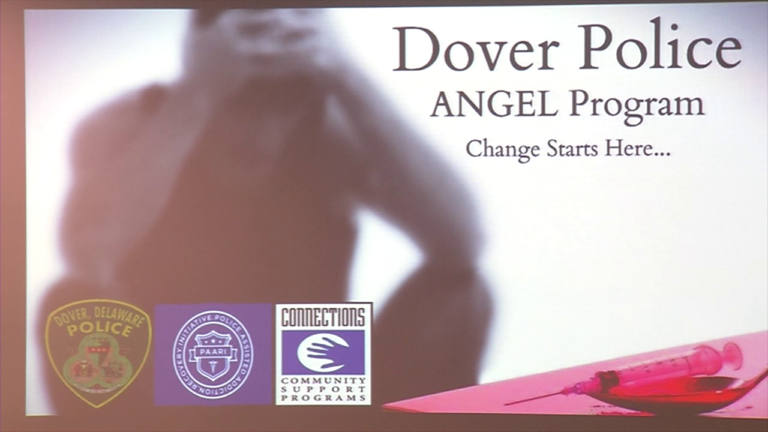Dover Police introduce “open door policy” for drug addicts

For years, the word “addict” has been synonymous with “criminal”. Now slowly but surely that mindset is transitioning to associate addicts as those who suffer from a disease. Now, Dover police are mirroring a program other departments across the country use. It allows addicts to walk in the door, hand their drugs over, and get the medical and emotional help they need from volunteers.
Addiction is a multi faceted disease, so Delaware officials are now trying to curb the growing problem of opioid addiction with a multi faceted approach through the angel program.
First and foremost is prevention. Secretary Rita Landgraf of the Delaware Division of Health and Social Services says “unfortunately this disease does not have a vaccine where you can cure it or even control it if you will”.
However, prevention is too late for those who already suffer from addiction, so better medical access is the next logical step. When an addict seeks help, those first few moments are critical in sustained treatment. Landgraf says “we’ve lost people just in that engagement period, because they didn’t know where to go many times they would go to places that were already full.”
Dover PD is one of many departments in the country, recognizing a trend within the opioid epidemic – drugs so deadly that even dealers are supplying their buyers with the life saving counter drugs that officers often use. Referring to the deadly “designer drug” W18, which is reported to be 10,000 times stronger than morphine, Chief Paul Bernat of Dover PD says “the dealers there are actually giving them narcan along with that – that’s how potent it is. So I mean that tells you right there, it speaks volumes.”
As of Thursday, Dover PD now has an open door policy, allowing addicts to turn in their drugs right at police headquarters. Instead of being thrown in jail, they are met with support from volunteers staffed through the Connections community support program.
Landgraf says those suffering from an addiction have an opportunity to come in and not be fearful of any arrest, adding “quite actually the opposite”, because to many, a lifetime of addiction is a far more severe punishment than a lifetime behind bars.


